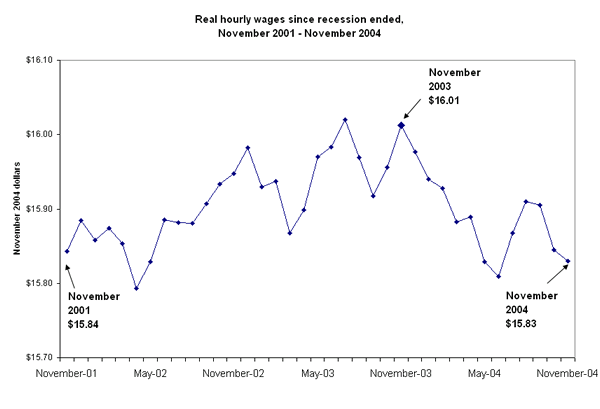See Snapshots Archive.
Snapshot for December 17, 2004.
No Wage Progress Despite Three Years of Recovery
As of last month, the economic recovery that officially began in November 2001 was three years old. Yet, as the figure below reveals, hourly earnings (adjusted for inflation) fell 1.3% over the past year and are now at about the same level now as they were when the recovery began.
Real wages grew strongly in the latter 1990s, and the momentum from that period kept wages rising through the recession and jobless recovery. But even though the economy began to add some jobs last year, the rate of growth has been too slow and inconsistent to absorb the slack that remains in the job market. Under such conditions, employers are less compelled to pass along gains in profits or productivity onto workers’ wages. This phenomenon is evident in the deceleration of nominal wages, which grew at an average annual rate of 3.9% in 2000 compared to just 2.1% thus far this year.
Add to that the fact that higher commodity prices have pushed up the rate of inflation in recent months, contributing to the slide in real wages that began about a year ago. As shown in the figure, real hourly wages briefly reversed course for a few months in spring 2004, but the general trend over the past year has been negative, with the buying power of the hourly wage down $0.21 (or 1.3%) this year. Thus, three years into an economic recovery that has seen robust profits and productivity growth, the hourly wage of most workers has not advanced at all.

Data source: All data are from the Bureau of Labor Statistics (BLS).
The wages in the figure are for production workers in manufacturing and non-supervisors in services. Such workers represent about 80% of the workforce. To match the BLS wage release of these data, we deflate nominal wages by the CPI-W.
Today’s snapshot was written by EPI economist Jared Bernstein, with research assistance from Yulia Fungard.
